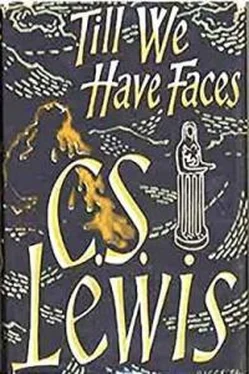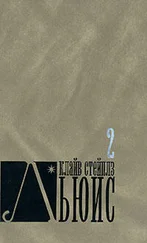The gods helping … but would they help? Nevertheless I must begin. And it seemed to me they would not help. I would set out boldly each morning to be just and calm and wise in all my thoughts and acts; but before they had finished dressing me I would find that I was back (and knew not how long I had been back) in some old rage, resentment, gnawing fantasy, or sullen bitterness. I could not hold out half an hour. And a horrible memory crept into my mind of those days when I had tried to mend the ugliness of my body with new devices in the way I did my hair or the colours I wore. I’d a cold fear that I was at the same work again. I could mend my soul no more than my face. Unless the gods helped. And why did the gods not help?
Babai! A terrible, sheer thought, huge as a cliff, towered up before me; infinitely likely to be true. No man will love you, though you gave your life for him, unless you have a pretty face. So (might it not be?) the gods will not love you (however you try to pleasure them, and whatever you suffer) unless you have that beauty of soul. In either race, for the love of men or the love of a god, the winners and losers are marked out from birth. We bring our ugliness, in both kinds, with us into the world; with it our destiny. How bitter this was, every ill–favoured woman will know. We have all had our dream of some other land, some other world, some other way of giving the prizes, which would bring us in as the conquerors; leave the smooth, rounded limbs, and the little pink and white faces, and the hair like burnished gold, far behind; their day ended, and ours come. But how if it’s not so at all? How if we were made to be dregs and refuse everywhere and everyway?
About this time there came (if you call it so) another dream. But it was not like a dream, for I went into my chamber an hour after noon (none of my women being there) and without lying down, or even sitting down, walked straight into the vision by merely opening the door. I found myself standing on the bank of a bright and great river. And on the further bank I saw a flock; of sheep, I thought. Then I considered them more closely, and I saw that they were all rams, high as horses, mightily horned, and their fleeces such bright gold that I could not look steadily at them. (There was deep, blue sky above them, and the grass was a luminous green like emerald, and there was a pool of very dark shadow, clear–edged, under every tree. The air of that country was sweet as music.) “Now those,” thought I, “are the rams of the gods. If I can steal but one golden flock off their sides, I shall have beauty. Redival’s ringlets were nothing to that wool.” And in my vision I was able to do what I had feared to do at the Shennit; for I went into the cold water, up to my knee, up to my belly, up to my neck, and then lost the bottom and swam and found the bottom again and came up out of the river into the pastures of the gods. And I walked forward over that holy turf with a good and glad heart. But all the golden rams came at me. They drew closer to one another as their onrush brought them closer to me, till it was a solid wall of living gold. And with terrible force their curled horns struck me and knocked me flat and their hooves trampled me. They were not doing it in anger. They rushed over me in their joy; perhaps they did not see me; certainly I was nothing in their minds. I understood it well. They butted and trampled me because their gladness led them on; the Divine Nature wounds and perhaps destroys us merely by being what it is. We call it the wrath of the gods; as if the great cataract in Phars were angry with every fly it sweeps down in its green thunder.
Yet they did not kill me. When they had gone over me, I lived and knew myself, and presently could stand on my feet. Then I saw that there was another mortal woman with me in the field. She did not seem to see me. She was walking slowly, carefully, along the hedge which bordered that grassland, scanning it like a gleaner, picking something out of it. Then I saw what. Bright gold hung in flecks upon the thorns. Of course! The rams had left some of their golden wool on them as they raced past. This she was gleaning, handful after handful, a rich harvest. What I had sought in vain by meeting the joyous and terrible brutes, she took at her leisure. She won without effort what utmost effort would not win for me.
I now despaired of ever ceasing to be Ungit. Though it was spring without, in me a winter which, I thought, must be everlasting, locked up all my powers. It was as if I were dead already, but not as the god, or Socrates, bade me die. Yet all the time I was able to go about my work, doing and saying whatever was needful, and no one knew that there was anything amiss. Indeed the dooms I gave, sitting on my judgment seat, about this time, were thought to be even wiser and more just than before; it was work on which I spent much pains and I know I did it well. But the prisoners and plaintiffs and witnesses and the rest now seemed to me more like shadows than real men. I did not care a straw (though I still laboured to discern) who had a right to the little field or who had stolen the cheeses.
I had only one comfort left me. However I might have devoured Bardia, I had at least loved Psyche truly. There, if nowhere else, I had the right of it and the gods were in the wrong. And as a prisoner in a dungeon or a sick man on his bed makes much of any little shred of pleasure he still has, so I made much of this. And one day, when my work had been very wearisome, I took this book, as soon as I was free, and went out into the garden to comfort myself, and gorge myself with comfort, by reading over how I had cared for Psyche and taught her and tried to save her and wounded myself for her sake.
What followed was certainly vision and no dream. For it came upon me before I had sat down or unrolled the book. I walked into the vision with my bodily eyes wide open.
I was walking over burning sands, carrying an empty bowl. I knew well what I had to do. I must find the spring that rises from the river that flows in the deadlands, and fill it with the water of death and bring it back without spilling a drop and give it to Ungit. For in this vision it was not I who was Ungit; I was Ungit’s slave or prisoner and if I did all the tasks she set me perhaps she would let me go free. So I walked in the dry sand up to my ankles, white with sand to my middle, my throat rough with sand; unmitigated noon above me, and the sun so high that I had no shadow. And I longed for the water of death; for however bitter it was, it must surely be cold, coming from the sunless country. I walked for a hundred years. But at last the desert ended at the foot of some great mountains; crags and pinnacles and rotting cliffs that no one could climb. Rocks were loosened and fell from the heights all the time; their booming and clanging, as they bounced from one jag to another, and the thud when they fell on the sand, were the only sounds there. Looking at the waste of rock, I first thought it empty, and that what flickered over its hot surface were the shadows of clouds. But there were no clouds. Then I saw what it really was. Those mountains were alive with innumerable serpents and scorpions that scuttled and slithered over them continually. The place was a huge torture chamber, but the instruments were all living. And I knew that the well I was looking for rose in the very heart of these mountains.
“I can never get up,” said I.
I sat upon the sand gazing up at them, till I felt as if the flesh would be burned off my bones. Then at last there came a shadow. Oh, mercy of the gods, could it be a cloud? I looked up at the sky and was nearly blinded, for the sun was still straight above my head; I had come, it seemed, into that country where the day never passes. Yet at last, though the terrible light seemed to bore through my eyeballs into my brain, I saw something; black against the blue, but far too small for a cloud. Then by its circlings I knew it to be a bird. Then it wheeled and came lower and at last was plainly an eagle; but an eagle from the gods, far greater than those of the highlands in Phars. It lighted on the sand and looked at me. Its face was a little like the old Priest’s, but it was not he; it was a divine creature.
Читать дальше











